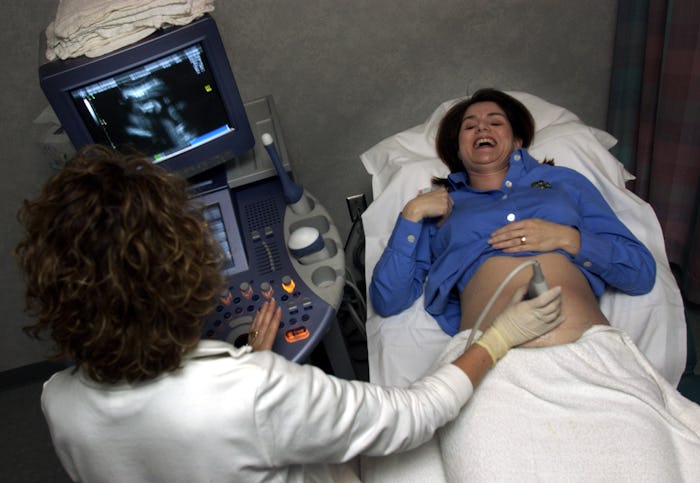Life

Pregnant Women Should Pay Attention To How Hard Their Baby Is Kicking, Science Says
There's nothing quite as exciting during a first-time pregnancy than feeling your baby kick — and for years now, we've known that it's a healthy sign to keep an eye on during the last few months of pregnancy. But one new study recently shed more light on babies' calisthenics in the womb, and the details are actually pretty cool: as it turns out, scientists now know just how hard babies are kicking in utero, and it's helping them learn exactly how those kicks benefit growing fetuses' health.
For the study, which was published in the Journal of the Royal Society Interface earlier this week, researchers used MRI scanning to peek at fetuses' kicks. They put together specialized computer models to calculate the force of those kicks as well as the impact on the fetuses' bones. The results? Babies' kicks grow stronger in utero as they develop, and those movements help build up stronger bones.
At 20 weeks' gestation, researchers found, fetuses kick with up to 6.5 pounds of force, a number that creeps up to 10.5 pounds by week 30. At 35 weeks into the pregnancy, though, that number drops to 3.8 pounds of force as the fetus quickly runs out of room in their mother's womb.
The kicks serve a useful purpose, as well: the pressure to the baby's skeleton — caused by the kicking — helps them develop healthy bones and joints. And as the force of babies' kicks increases and the space around them shrinks in the later half of gestation, the pressure to the babies' skeleton increases, helping them develop healthily as they get closer to birth.
"This increasing trend with gestational age is important because changes in fetal movement patterns in late pregnancy have been linked to poor fetal outcomes and musculoskeletal malformations," the researchers, a team from the Imperial College London, wrote in the study.
Essentially, those (apparently quite strong) kicks that your baby is delivering means things are progressing well inside the womb. And that necessary development means pregnant women who feel a decrease in kicks in later stages of pregnancy should see their doctor.
"Every provider tells their patients something a little bit different," Dr. Jennifer Keller, assistant professor at the department of obstetrics and gynecology at George Washington University, told Parents in 2012. "Some tell them to look for about 10 movements per day, some say 'pick an hour, concentrate on the baby and look for three or four movements in that hour.'"
Pregnant women should call their doctors, Keller said, if they feel a deviation in their baby's kicking habits. (Some are more active at different times of the day, or may wiggle more when their mom lies in certain positions.) And while movements may slow down near the end of pregnancy — from about 10 pounds of force to four, to be specific — they should still be occurring.
"A decrease in the movements of the baby can be a sign that the placenta is not transferring oxygen and nutrients to the baby as efficiently as it was in the past," Keller told Parents. She continued:
This could lead to poor growth of the baby or even stillbirth, and it's why physicians take a decrease in movement so seriously.
So pregnant women should really keep an eye on their baby's forceful little kicks, since there is much more to the movements that lies below the surface. It's amazing just how connected all these aspects of growing a human are — and it's details like this that really make you realize how cool the human body is.
Check out Romper's new video series, Romper's Doula Diaries:
Watch full episodes of Romper's Doula Diaries on Facebook Watch.